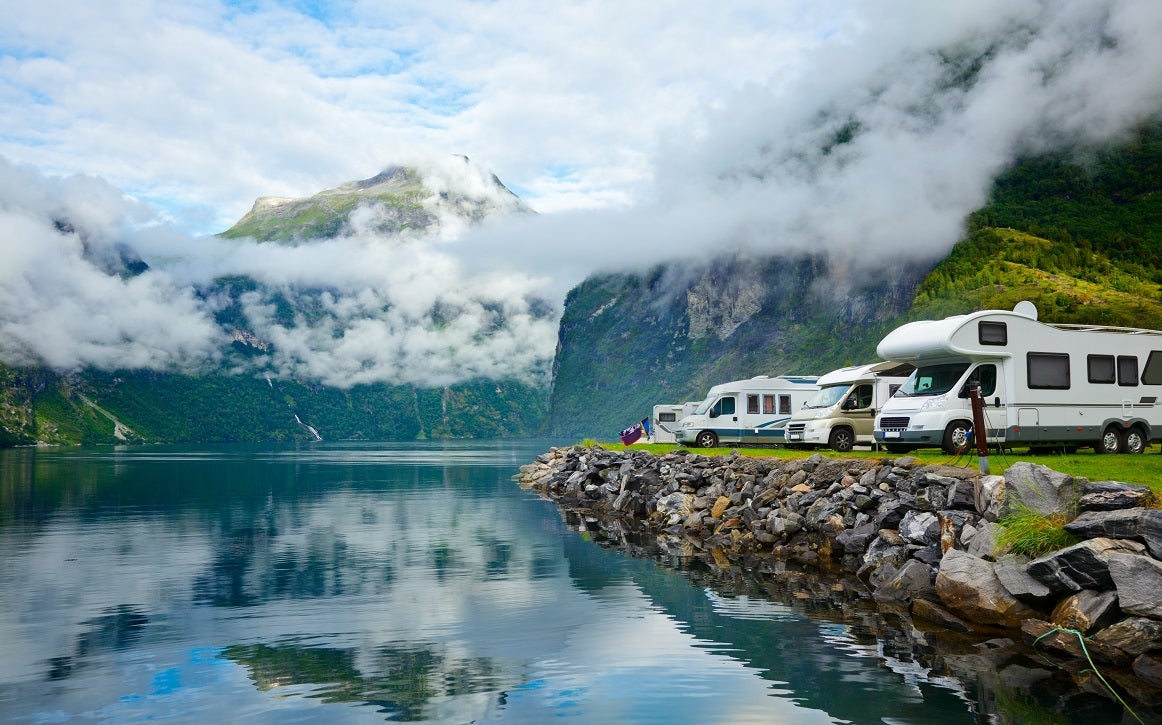
Our Editors independently research, test, and rate what we feel are the best products. We use affiliate links and may receive a small commission on purchases.
For any outdoor enthusiast, RV travel and lifestyle is a great way of experiencing nature while getting around and staying in relative comfort.
From trailers and fifth wheels to camper vans and large motorhomes, it’s possible to live frugally with a minimal setup or deck out your rig with luxurious amenities.
To each his own, we say – this introduction to recreational vehicles covers important aspects of preparation before you go on a trip, helpful tips while on the road, and how to boondock, that is stay off-grid in the wild.
Whether you just want to learn a bit about traveling with a recreational vehicle or are curious about living in a motorhome full-time, we’ll go over the basics of RVing and answer common questions.
RV Basics 101
With proper preparation, you can avoid many setbacks later on. From diligently planning your route to bringing important gear, think ahead of what situations you might encounter and what you’ll need, then prepare your vehicle.
Doing the brunt of the workload before you hit the road will make the actual trip so much more enjoyable.
Vehicle
Should you not yet own a recreational vehicle, consider what about RVing appeals to you and where you’d like to go. What kind of vehicle do you see yourself driving there?
Are you looking for a trailer for an existing car or truck you own, or do you want a complete motorhome? Comparing floor plans of vehicles can help you make a decision.
Trailers can be small and compact thanks to pop-ups and slide-outs so you can tow them with your regular car, van or SUV.
Other travel trailers and fifth wheels are not hitched to a trailer ball at the rear bumper but a truck bed hitch close to the rear axle, which offers advantages in pulling.
RV shows and conventions are opportunities to see a lot of different vehicles up close, though for buying, you local dealer might have a better price. Use an overview of RV vehicles to find the right size and type for you.
Budget
RV travel is not necessarily cheaper than taking a regular vacation where you pay for flights and hotels. You’ll have large initial costs for the vehicle (or down payments) and equipment.
On top of that, there is insurance, RV maintenance and upkeep, RV storage fees (while the vehicle is not in use), as well as vehicle registration and licensing.
On the road, you’ll pay for fuel (including any equipment such as a generator or gas grill), food and dining out, laundry, RV site rent and hookups for water and electricity and other expenses.
Also consider the cost for subscription services you might require: RV association membership fees, phone and internet, satellite service, or mail forwarding.
Do a detailed tally of your expenses and budget for repairs and other eventualities.
Getting Organized
“A place for everything, and everything in its place.” RVing means living in a confined space where organization is crucial. Just like with any trip, packing and loading your recreational vehicle is an art.
Downsizing can help you save space and weight, but you also don’t want to miss essential necessities and basic comforts. To strike the balance that’s right for you, think of stowage and storage solutions and where everything will go.
It’s important to stay within the vehicle’s weight limitations as well as to have everything tied or secured so nothing moves or shifts during travel. A travel trailer weight calculator can help.
To get organized, write a packing list for your RV and note where you store each item. Hang up the list in a prominent location and always return things to their proper place.
HVAC: Heating, Ventilation, Air Conditioning
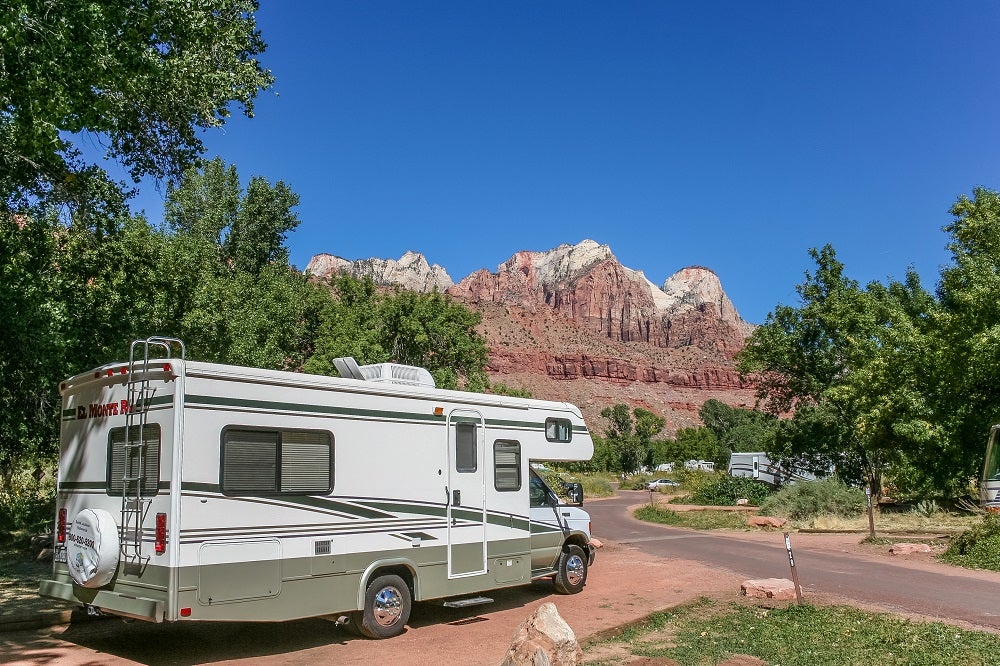
Temperature control is an important issue as you want to drive and sleep in relative comfort in your motorhome or trailer, so make sure your RV is equipped with the necessary appliances.
In warmer climates, a fan running off 12V power can be sufficient to stir the air and provide relief, but when things get hot, you’ll need proper air conditioning.
These can be upgraded with a heating element to provide hot air as well and are powered by shore power, a battery bank or a generator. We’ve dedicated a full article to the subject of air conditioning and have reviewed the top rated RV air conditioners.
If the cold is more an issue for your travels, consider a dedicated electric space heater. Some RVs come with an included furnace fueled by propane. A water heater can be electric, propane or dual with the option to switch as needed.
Climate control is typically easier in hot weather as a fan or AC unit is straightforward. Vehicle insulation is an important factor in keeping warm in cold climates.
Regular stays below freezing temperatures are a challenge and require a “four seasons” RV, and you’ll have to keep water tanks and lines as well as propane from freezing.
RV Batteries
At most RV parks and also at campgrounds, you can get an electricity hook up and rely on “shore power.” It’s plug’n’play and enables you to use your 120V AC appliances, just like at home.
On the road and dry camping require another power source, which typically comes in the form of 12V DC batteries. These are different from 12V car batteries (also called starter batteries) as they are designed for regular deep discharges – hence the name “deep cycle batteries.”
We explain the issue in full detail in a separate article and have also reviewed the best RV deep cycle batteries to help you construct a power bank for your vehicle. You’ll also learn charging basics and why you need a power inverter.
RV Memberships
A membership in a camping or RV club offers discounts at participating campgrounds and RV parks as well as other benefits and is worth considering if you plan to make use of these sites a lot.
Both Passport America and Good Sam Club have browsable lists of participating sites. RV clubs such as Escapees have community features and tools such as a mail forwarding service.
Harvest Hosts members can enjoy unique overnight stays at wineries, farms and other attractions.
Internet Connectivity
As nice as it is to get away from it all, many RVers have to rely on phone and internet service for work or to stay in touch with the rest of the world.
You can use a cell booster such as the weBoost Drive 4G-X RV 470410 to greatly amplify your signal while you’re driving and camping in areas with low coverage. If you depend on internet and phone for work, we’d highly recommend it.
When you’re parked, it can be frustrating to be just outside of WiFi reach, which is where an extender like the Winegard WF-3000 is a practical solution.
Satellite internet is a more costly option, both for the portable satellite hub and the monthly subscription. To watch TV in your RV, you can mount a satellite dish or a TV antenna to pull in a signal from local stations.
Some models even allow you to watch while on the move – learn all about the different TV antennas and satellite dishes in our extensive review.
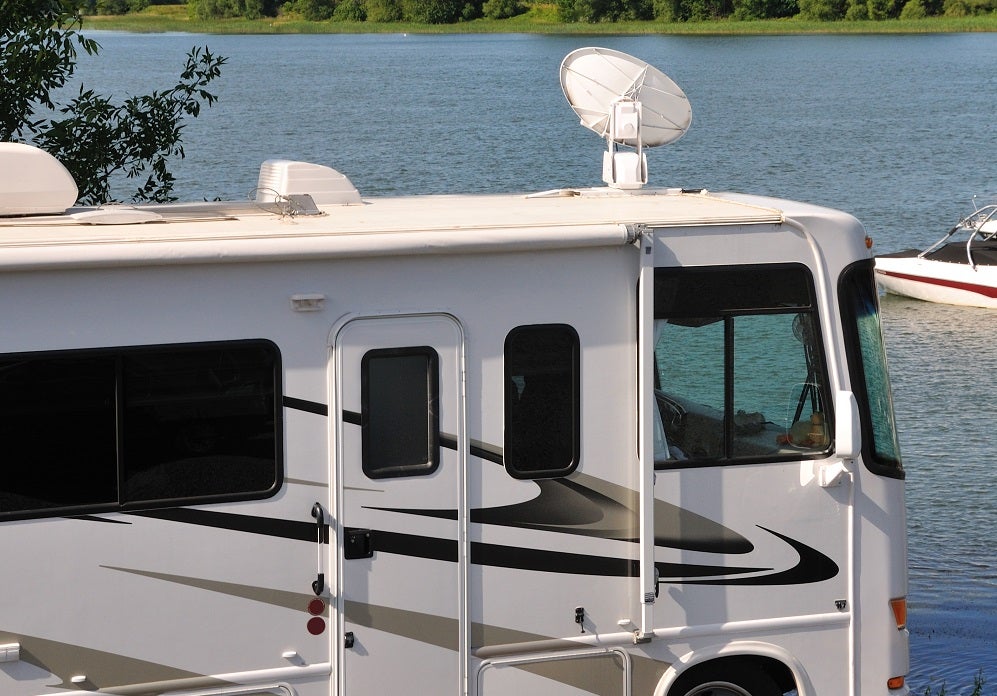
Other Essentials
This list is far from complete, so do your own research and talk to other RVers on what to bring on a trip.
The following are assorted must-have items for your recreational vehicle not mentioned in other parts of this article: wheel chocks keep your trailer or vehicle in place while leveling blocks help you avoid tilt due to uneven or unstable ground; both are light and work better than 2x4s or cinder blocks.
A tire pressure gauge helps you maintain proper inflation.
The more minimal and less equipped your motorhome or trailer is, the more it might be useful to consider bringing portable camping equipment such as chairs, a stove for cooking, a lantern, cooler, shower and a camping knife.
If it’s easier for your vehicle to stay put while camping, a folding bike can be an option for exploring your surroundings.
On The Road
The following tips mainly concern basic RV traveling advice, but they also contain information about things you can do or get in advance before you hit the road.
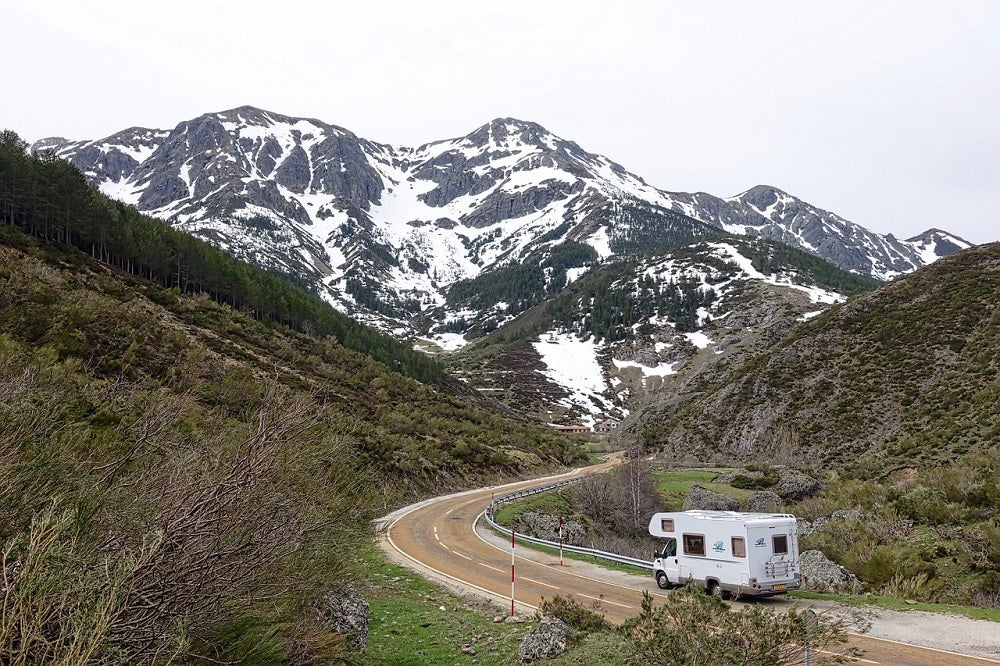
Navigation
When you start your RV adventure big or small, you should of course be comfortable driving, handling and parking your vehicle.
Navigation poses a whole different challenge, though, especially if you’re used to driving a regular car: all of as sudden, you have to be aware of height and weight limits and other accessibility issues.
A specialized RV GPS navigator not only offers the benefit of a larger screen with more information, it also features smart navigation with a personal vehicle profile so you can easily find the best route for your particular RV.
Use our list of the Top Rated RV GPS navigators to find the right model. Navigating with just a map is a valuable skill as well: keep a road atlas at hand and learn how to use it.
Setting Up Camp
This checklist includes the most important points you’ll go over when setting up camp at an RV park or campground:
- Upon arrival, pull up in the designated area to complete the check-in. As an RV newbie, you can ask for guidance getting parked and set up.
- Scout out your lot or site beforehand to see if you need to back in and how to position your vehicle properly aligned with hookups for electricity, water and waste. Check for branches and obstacles and make sure any awnings or slide-outs have enough room.
- When you’re settled, engage the parking brake and apply leveling blocks and chocks. If you have a trailer, disconnect it and stabilize the hitch. Unfold your pop-out or remove the travel locks and engage the slide-outs.
- Connect electricity and watch for the right amperage required for your RV. Switch your vehicle (and appliances) to shore power instead of batteries. Set up your power bank for charging if needed.
- Connect your RV to the potable water source. At this point, you won’t need the internal water pump if you have one.
- If there is sewer service, run your sewer hose from the sewer drain outlet to the campground sewer (wearing latex gloves!).
- If you have gas for cooking or heating, you can open the gas supply valve.
- Check that all connected cables and hoses are stowed neatly to prevent tripping. Extend your awnings and TV antenna if you have them and then settle in!
Electricity
Hookups at campsites and RV parks are usually metered, so you pay according to what you use. Occasionally you’ll be charged a flat rate for a power hookup.
Though your rig will come with everything you need for connecting electricity, a few things are great to have: a 30A RV extension cord is essential whenever you can’t park close to a power outlet.
As for adapters, a 30A to 50A surge protector is important if your RV runs on 50A and you need to connect to 30A service (which is bound to happen). A 30A to 15A adapter allows you to plug into a regular outlet.
Water & Waste
Drinking water is stored in your vehicle’s freshwater tank, sometimes called blue tank. Gray water is used water from your sink and shower, collected in a gray water tank.
Lavatory waste goes into the black tank. To keep vehicle weight down, it’s better to drive with empty tanks, but you need to know when and where you can fill up your fresh water supply again.
Waste tanks should generally not be emptied until they’re at least 2/3 full as it’s necessary for solid matter to be suspended in water to effectively drain. Always wear gloves and never use a drinking water hose for anything else!
The black tank is emptied before the gray one to better flush out waste, and it might be necessary to flush the black tank with more water afterwards to rinse it out.
If there is no sewage connection directly at the individual lots, the campground might have a dedicated site. It’s best to learn how to dump tanks before having to do so.
Apart from disposable gloves, the following tools are great to have to ease your water and waste management: a long enough drinking water hose makes filling up your fresh water supply straightforward, while a hose connector makes attaching your hose so much more convenient.
A water pressure regulator protects your pipes from too high pressure and a water filter is great if you ever have reason to doubt the water quality. As for the septic tank, you can take the stink out of dumping the waste with RV toilet treatment or tank treatment.
You’ll also need a sewer hose and tracks to keep things flowing downhill. With a clear sewer adapter, you’ll know when your tanks are done dumping. Always store your septic tools in a dedicated and closed space to prevent contamination and sanitize them regularly.
Basics of Boondocking
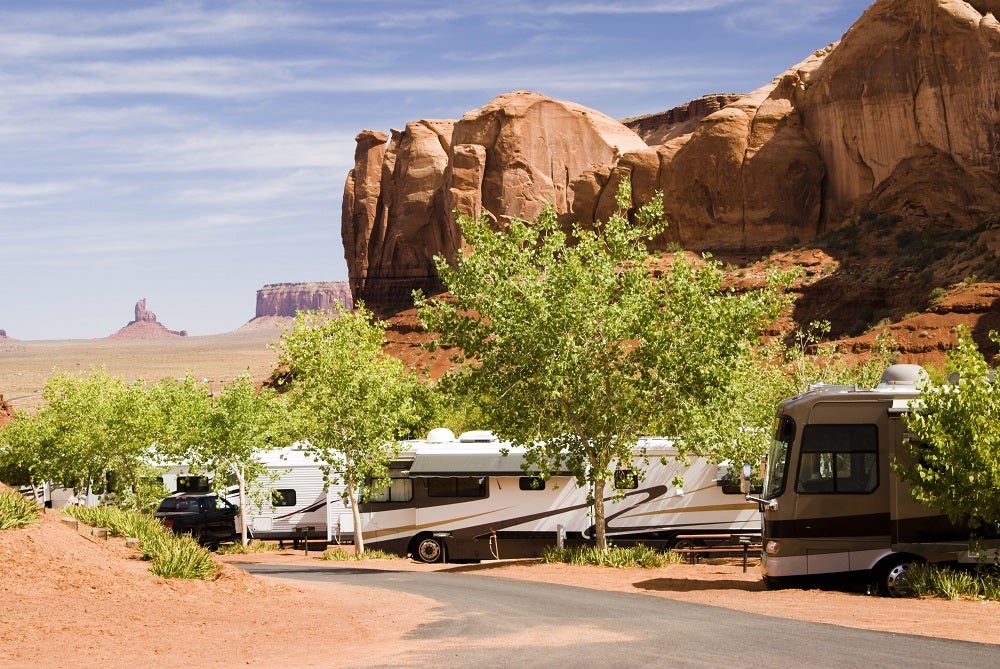
RV camping in free spots is called boondocking. Staying in the middle of nowhere allows you to enjoy scenery and nature, but also means you have to be self-sufficient without relying on hookups. The following tips will help you get accustomed to this style of RVing.
Water Supply
Water is life, and serious boondocking is only possible with a sufficient freshwater supply. The more you can bring the better, but try to load up as close to your destination as possible to reduce travel time with the extra weight.
The more water you can conserve, the longer you can stay out there – for most campers, it’s a compromise between convenience and frugality. 60 gallons can last you 5 to 7 days if you limit yourself to two showers and sponge baths and quick rinsing of dishes.
Dedicated boondockers tend to fit their rigs with extra water tanks. If you’ll go far from civilization, consider bringing a water filter also.
Off-grid electricity
For boondocking, your vehicle needs a inverter power bank with enough capacity to run all your essential appliances. Since you won’t have shore power to recharge, you need an alternative power source.
Especially in sunny regions, solar is a convenient and free energy source, so you should consider fitting your roof with an RV solar panel kit. A generator allows you to use gasoline, propane or diesel for your electricity needs and charging your batteries.
We have reviewed our top rated RV generators in a full article for you.
Sanitation Dumps
When you’re boondocking, you need to pack out all your trash and collect your waste. If your holding tanks are larger than your freshwater supply, you only have to do a dump once it’s time to refill your drinking water.
Otherwise you’ll have to calculate how soon your tanks will be full. So-called sanitation dumps are possible at dedicated stations. Under no circumstances should you dump waste or even gray water anywhere in the wilderness!
Boondocking sites
When you’re new to this style of RVing, where to stay is the big question. You can start with dry camping (with no hookups) and look at simple public land campgrounds which are administered by the Bureau of Land Management (BLM), the US Forest Service (NFS), the US Army Corps of Engineers (COE), the National Park Service (NPS), Public Utilities, Bureau of Reclamation. Many national parks have RV sites as well, here is a good list of parks not to be missed.
These sites are not always free but cheaper and more private than regular campgrounds.
Government agencies refer to boondocking as “dispersed camping,” which is sometimes designated. By law, you can camp anywhere in a national forest or on BLM land where it is not prohibited as long as you do not block roads, don’t destroy vegetation and make use of an existing, ample camping spot.
Before staying on private property, always get permission from the land owner.
FAQs About RVing
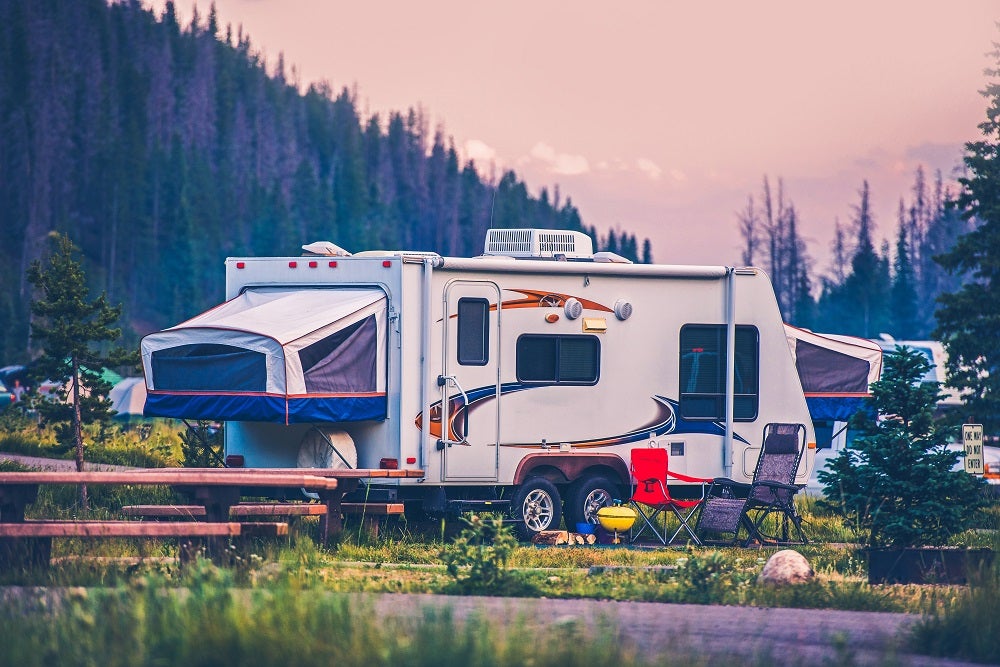
Q: Where can I stay?
A: It will mostly depend on where you are, but RV parks are campgrounds with specific amenities for recreational vehicles and trailers, such as showers, bathrooms, laundry, hookups for water and electricity and often internet and even cable TV.
Regular campgrounds can typically accommodate fewer vehicles and might not have waste water disposal. You might also stay at trailer parks, though these are commonly used by people living there as opposed to travelers passing through.
RVers report less opportunities to boondock in the eastern half of the US, while the west coast offers plenty of state and national parks as well as public land and the option to stay at wineries.
Q: How much does the average RV park cost?
A: Parks average around $30 per night, but can go much higher and tend to be more expensive on the west coast.
Q: What is Boondocking?
A: The term refers to camping in an RV or trailer in a place where no permit is necessary and no fee applies. Since that’s usually in the middle of nowhere (“out in the boondocks”), RVers call this kind of stay off the grid boondocking, though it could also be in a parking lot or on public land.
“Dry camping” simply means no hookups for electricity and water and could also refer to staying in a campground, whereas boondocking is typically in completely undeveloped areas. Government agencies might use the term “dispersed camping.”
Q: What should I do about phone & internet?
A: The longer you’ll travel, the more you’ll want to look at some kind of plan for phone and internet, possibly with unlimited data. Do you research based on where you’ll travel, but for coverage in nearly all 50 states, the choices seem to boil down to AT&T and Verizon.
Should you be working out of your RV and require internet, don’t rely on the WiFi at parks and in public locations since it can be slow or have a weak signal.
Q: What’s the difference between a “tiny house” and an RV or trailer?
A: Tiny houses are minimal living arrangements of about 150 square feet or even less with a modern and functional design. They can be mobile on wheels with a trailer hitch, but tend to be more suitable for staying longer in one location.
What’s best for you entirely depends on your mode of travel and your preferences.
Q: How many miles per gallon do you get in an RV?
A: Your ratio will largely depend on the size and type of vehicle. Modern RVs are more fuel-efficient, but you also have to factor in drag and load weight. As a rule of thumb, expect 6 to 8 miles per gallon – or roughly $3,000 per 10,000 miles.
Q: What type of RV should I choose?
A: Many people prefer a motorhome or camper van for their RV because they enjoy a solution where everything is contained in a single vehicle. Opposed to that are trailers, pull-behinds, fifth wheels or truck campers where the living / sleeping compartment is separate from the vehicle.
The “recreational area” in these solutions is generally not accessible while driving, but you might enjoy more flexibility when staying put longer because you can use the vehicle independently.
The choice is yours – consider what addition to your existing vehicle(s) is efficient and what you feel comfortable driving.
Conclusion
There are many reasons people choose the RV lifestyle: some work remotely or are self-employed and like to travel the country; others follow the sun, enjoy their retirement on the move or seek adventure in remote areas, and some enjoy being off-the-grid.
Among the benefits are that you travel wherever roads can take you while bringing your own home and surroundings with you – with all the comfort you want.
We hope you can put this introduction to basic RVing to good use and enjoy your travels! For more tips, pick up a beginner’s guide.
